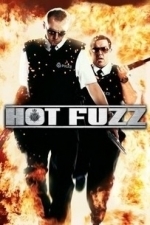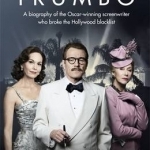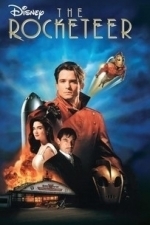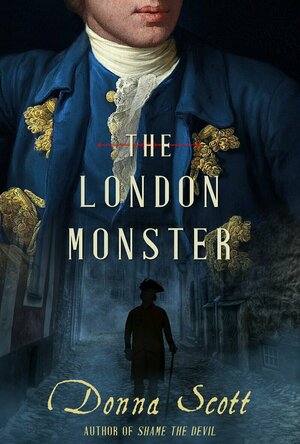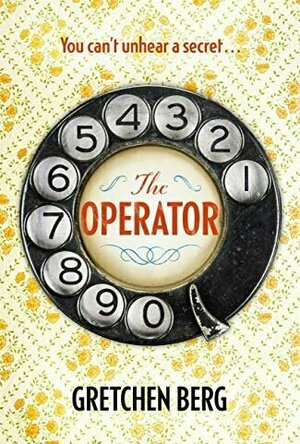Search
LeftSideCut (3776 KP) rated Hot Fuzz (2007) in Movies
Aug 3, 2019
An instant classic
Hot Fuzz is a glorious film, plain and simple.
It's funny, it's crude, it's gory, it's just plain ridiculous at times, and it's very British...
Anyone who lives here in England can confirm - this country is full of little villages and towns where something just seems a bit...off. just like the films village, Sandford.
As Sgt. Angel starts to uncover a sinister conspiracy underneath the idyllic town, Hot Fuzz effortlessly weaves quick humour, with a creeping sense of dread, just like it's predecessor, Shaun of the Dead.
The fantastic trio of Simon Pegg, Nick Frost, and director Edgar Wright hit all the right comedic notes once again, and the film is riddled with famous faces from the British comedy scene.
It evens features once-James-Bond Timothy Dalton, just being generally awesome and villainous.
The climatic battle, (that likes fun at the silliness of the action genre) is good fun, but it doesn't quite hit the mark that Shaun of the Dead does.
It's still a great film though, I'd implore anyone to give it a go.
It's funny, it's crude, it's gory, it's just plain ridiculous at times, and it's very British...
Anyone who lives here in England can confirm - this country is full of little villages and towns where something just seems a bit...off. just like the films village, Sandford.
As Sgt. Angel starts to uncover a sinister conspiracy underneath the idyllic town, Hot Fuzz effortlessly weaves quick humour, with a creeping sense of dread, just like it's predecessor, Shaun of the Dead.
The fantastic trio of Simon Pegg, Nick Frost, and director Edgar Wright hit all the right comedic notes once again, and the film is riddled with famous faces from the British comedy scene.
It evens features once-James-Bond Timothy Dalton, just being generally awesome and villainous.
The climatic battle, (that likes fun at the silliness of the action genre) is good fun, but it doesn't quite hit the mark that Shaun of the Dead does.
It's still a great film though, I'd implore anyone to give it a go.
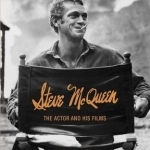
Steve McQueen: The Actor and His Films
Andrew Antoniades and Mike Siegel
Book
Steve McQueen: The Actor and his Films, is the definitive account of every film that the iconic...
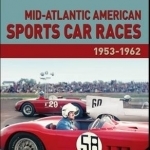
Mid-Atlantic American Sports Car Races 1953-1962
Book
The history of sports car racing in the states of Delaware, Maryland, West Virginia and Washington...
Film tie-in
I received this book for free through Goodreads First Reads.
Nominated for an Oscar, BAFTA and Golden Globe,Trumbo is a recent film based on the original biography Dalton Trumbo written by Bruce Cook in 1977. Its adaptation to film provided the perfect opportunity to republish this extremely well researched book. With a forward written by John McNamara, the screenwriter of the motion picture, the story of Dalton Trumbo’s life is just as intriguing as it was almost forty years ago. But who is Trumbo?
If, like me, you have never heard of Trumbo or even the infamous “Hollywood Ten,” it may take a while for it to become clear as to why it was worth Cook’s time to produce a book about the man. Dalton Trumbo was a well-known screenwriter of films such as Papillon, Lonely Are The Brave and Roman Holiday as well as author of the novel Johnny Got His Gun. However these are not all he is famous for. During his life, Trumbo became a member of the Communist Party, which Hollywood branded as an Un-American Activity and thus blacklisted him, as well as other screenwriters, directors and actors. Ten of these men, Trumbo included, were imprisoned for their political beliefs – yet nothing prevented Trumbo from continuing his fairly successful career.
Interestingly, Cook begins the book with the final stages of Trumbo’s life. At time of writing Trumbo was still alive, although rather poorly. After contracting lung cancer, having a lung removed, and suffering a heart attack, Trumbo was a very sick man; nonetheless he was still enthusiastic about being interviewed and telling his personal story.
From his childhood, to his evening shifts at a bakery, Cook details Trumbo’s early life, emphasizing the hard upbringing he had before he found himself in the world of Hollywood. Although roughly 75% of the book focuses on Trumbo’s career, Cook highlights Trumbo as a family man, with both a wife and three children who he absolutely adores.
Cook constantly refers to the Hollywood Ten as a concept that the reader should already be familiar with. Granted, someone who picks up this book is more likely to do so having a prior interest in the central figure, and thus already know about his background; however those ignorant on the topic eventually gather a better understanding on the topic once reaching the relevant chapters. It also becomes clearer why Trumbo is worth reading/writing about – he may have been blacklisted, but he managed to break through all the barriers and reinstate his name and many others.
Reading this half a century after the event, it seems strange that Trumbo was imprisoned. He had not done anything intrinsically wrong, it was purely prejudice against his political beliefs that got him into the mess he found himself. But when you consider the events of the time: World War Two, the Cold War, the Korean War, and Vietnam; it is understandable why many feared those who claimed to be Communists.
Cook’s narrative does not flow as a story, and much of it is broken up with quotes from various people he interviewed. The timeline jumps about between past and present (1970s), which occasionally gets a bit confusing. A large part of the book is spent analyzing many of Trumbo’s works – both for screen and written formats – which, unless you have a particular interest, can be a little tedious.
It has got to be said that Bruce Cook was an exemplary writer with a great eye for detail. He did not jump to conclusions or only talk about things from his point of view. Instead he interviewed, what seems like, everyone who ever met Trumbo, and based his writing on fact backed up with numerous quotes and citations.
This edition of Trumbo contains a selection of photographs taken on the set of the movie. Disappointingly it does not contain any of Trumbo himself – you would think that some photos could have been tracked down!
Trumbo is not a book that will interest everyone. Most people today – particularly in England – will probably be unaware of who Dalton Trumbo was, and thus would only seek out this publication due to a fascination with film production. I have not seen the film, but after reading this and discovering how books go from novels, to screenplays to moving image, it would be interesting to find out which parts of Trumbo’s life made it onto the big screen.
Nominated for an Oscar, BAFTA and Golden Globe,Trumbo is a recent film based on the original biography Dalton Trumbo written by Bruce Cook in 1977. Its adaptation to film provided the perfect opportunity to republish this extremely well researched book. With a forward written by John McNamara, the screenwriter of the motion picture, the story of Dalton Trumbo’s life is just as intriguing as it was almost forty years ago. But who is Trumbo?
If, like me, you have never heard of Trumbo or even the infamous “Hollywood Ten,” it may take a while for it to become clear as to why it was worth Cook’s time to produce a book about the man. Dalton Trumbo was a well-known screenwriter of films such as Papillon, Lonely Are The Brave and Roman Holiday as well as author of the novel Johnny Got His Gun. However these are not all he is famous for. During his life, Trumbo became a member of the Communist Party, which Hollywood branded as an Un-American Activity and thus blacklisted him, as well as other screenwriters, directors and actors. Ten of these men, Trumbo included, were imprisoned for their political beliefs – yet nothing prevented Trumbo from continuing his fairly successful career.
Interestingly, Cook begins the book with the final stages of Trumbo’s life. At time of writing Trumbo was still alive, although rather poorly. After contracting lung cancer, having a lung removed, and suffering a heart attack, Trumbo was a very sick man; nonetheless he was still enthusiastic about being interviewed and telling his personal story.
From his childhood, to his evening shifts at a bakery, Cook details Trumbo’s early life, emphasizing the hard upbringing he had before he found himself in the world of Hollywood. Although roughly 75% of the book focuses on Trumbo’s career, Cook highlights Trumbo as a family man, with both a wife and three children who he absolutely adores.
Cook constantly refers to the Hollywood Ten as a concept that the reader should already be familiar with. Granted, someone who picks up this book is more likely to do so having a prior interest in the central figure, and thus already know about his background; however those ignorant on the topic eventually gather a better understanding on the topic once reaching the relevant chapters. It also becomes clearer why Trumbo is worth reading/writing about – he may have been blacklisted, but he managed to break through all the barriers and reinstate his name and many others.
Reading this half a century after the event, it seems strange that Trumbo was imprisoned. He had not done anything intrinsically wrong, it was purely prejudice against his political beliefs that got him into the mess he found himself. But when you consider the events of the time: World War Two, the Cold War, the Korean War, and Vietnam; it is understandable why many feared those who claimed to be Communists.
Cook’s narrative does not flow as a story, and much of it is broken up with quotes from various people he interviewed. The timeline jumps about between past and present (1970s), which occasionally gets a bit confusing. A large part of the book is spent analyzing many of Trumbo’s works – both for screen and written formats – which, unless you have a particular interest, can be a little tedious.
It has got to be said that Bruce Cook was an exemplary writer with a great eye for detail. He did not jump to conclusions or only talk about things from his point of view. Instead he interviewed, what seems like, everyone who ever met Trumbo, and based his writing on fact backed up with numerous quotes and citations.
This edition of Trumbo contains a selection of photographs taken on the set of the movie. Disappointingly it does not contain any of Trumbo himself – you would think that some photos could have been tracked down!
Trumbo is not a book that will interest everyone. Most people today – particularly in England – will probably be unaware of who Dalton Trumbo was, and thus would only seek out this publication due to a fascination with film production. I have not seen the film, but after reading this and discovering how books go from novels, to screenplays to moving image, it would be interesting to find out which parts of Trumbo’s life made it onto the big screen.
My rating: 3.5
<i>I received this book for free through Goodreads First Reads.</i>
Nominated for an Oscar, BAFTA and Golden Globe, <i>Trumbo</i> is a recent film based on the original biography <i>Dalton Trumbo</i> written by Bruce Cook in 1977. Its adaptation to film provided the perfect opportunity to republish this extremely well researched book. With a forward written by John McNamara, the screenwriter of the motion picture, the story of Dalton Trumbo’s life is just as intriguing as it was almost forty years ago. But who is Trumbo?
If, like me, you have never heard of Trumbo or even the infamous “Hollywood Ten,” it may take a while for it to become clear as to why it was worth Cook’s time to produce a book about the man. Dalton Trumbo was a well-known screenwriter of films such as <i>Papillon, Lonely Are The Brave</i> and <i>Roman Holiday</i> as well as author of the novel <i>Johnny Got His Gun</i>. However these are not all he is famous for. During his life, Trumbo became a member of the Communist Party, which Hollywood branded as an Un-American Activity and thus blacklisted him, as well as other screenwriters, directors and actors. Ten of these men, Trumbo included, were imprisoned for their political beliefs – yet nothing prevented Trumbo from continuing his fairly successful career.
Interestingly, Cook begins the book with the final stages of Trumbo’s life. At time of writing Trumbo was still alive, although rather poorly. After contracting lung cancer, having a lung removed, and suffering a heart attack, Trumbo was a very sick man; nonetheless he was still enthusiastic about being interviewed and telling his personal story.
From his childhood, to his evening shifts at a bakery, Cook details Trumbo’s early life, emphasizing the hard upbringing he had before he found himself in the world of Hollywood. Although roughly 75% of the book focuses on Trumbo’s career, Cook highlights Trumbo as a family man, with both a wife and three children who he absolutely adores.
Cook constantly refers to the Hollywood Ten as a concept that the reader should already be familiar with. Granted, someone who picks up this book is more likely to do so having a prior interest in the central figure, and thus already know about his background; however those ignorant on the topic eventually gather a better understanding on the topic once reaching the relevant chapters. It also becomes clearer why Trumbo is worth reading/writing about – he may have been blacklisted, but he managed to break through all the barriers and reinstate his name and many others.
Reading this half a century after the event, it seems strange that Trumbo was imprisoned. He had not done anything intrinsically wrong, it was purely prejudice against his political beliefs that got him into the mess he found himself. But when you consider the events of the time: World War Two, the Cold War, the Korean War, and Vietnam; it is understandable why many feared those who claimed to be Communists.
Cook’s narrative does not flow as a story, and much of it is broken up with quotes from various people he interviewed. The timeline jumps about between past and present (1970s), which occasionally gets a bit confusing. A large part of the book is spent analyzing many of Trumbo’s works – both for screen and written formats – which, unless you have a particular interest, can be a little tedious.
It has got to be said that Bruce Cook was an exemplary writer with a great eye for detail. He did not jump to conclusions or only talk about things from his point of view. Instead he interviewed, what seems like, everyone who ever met Trumbo, and based his writing on fact backed up with numerous quotes and citations.
This edition of <i>Trumbo</i> contains a selection of photographs taken on the set of the movie. Disappointingly it does not contain any of Trumbo himself – you would think that some photos could have been tracked down!
<i>Trumbo</i> is not a book that will interest everyone. Most people today – particularly in England – will probably be unaware of who Dalton Trumbo was, and thus would only seek out this publication due to a fascination with film production. I have not seen the film, but after reading this and discovering how books go from novels, to screenplays to moving image, it would be interesting to find out which parts of Trumbo’s life made it onto the big screen.
<i>I received this book for free through Goodreads First Reads.</i>
Nominated for an Oscar, BAFTA and Golden Globe, <i>Trumbo</i> is a recent film based on the original biography <i>Dalton Trumbo</i> written by Bruce Cook in 1977. Its adaptation to film provided the perfect opportunity to republish this extremely well researched book. With a forward written by John McNamara, the screenwriter of the motion picture, the story of Dalton Trumbo’s life is just as intriguing as it was almost forty years ago. But who is Trumbo?
If, like me, you have never heard of Trumbo or even the infamous “Hollywood Ten,” it may take a while for it to become clear as to why it was worth Cook’s time to produce a book about the man. Dalton Trumbo was a well-known screenwriter of films such as <i>Papillon, Lonely Are The Brave</i> and <i>Roman Holiday</i> as well as author of the novel <i>Johnny Got His Gun</i>. However these are not all he is famous for. During his life, Trumbo became a member of the Communist Party, which Hollywood branded as an Un-American Activity and thus blacklisted him, as well as other screenwriters, directors and actors. Ten of these men, Trumbo included, were imprisoned for their political beliefs – yet nothing prevented Trumbo from continuing his fairly successful career.
Interestingly, Cook begins the book with the final stages of Trumbo’s life. At time of writing Trumbo was still alive, although rather poorly. After contracting lung cancer, having a lung removed, and suffering a heart attack, Trumbo was a very sick man; nonetheless he was still enthusiastic about being interviewed and telling his personal story.
From his childhood, to his evening shifts at a bakery, Cook details Trumbo’s early life, emphasizing the hard upbringing he had before he found himself in the world of Hollywood. Although roughly 75% of the book focuses on Trumbo’s career, Cook highlights Trumbo as a family man, with both a wife and three children who he absolutely adores.
Cook constantly refers to the Hollywood Ten as a concept that the reader should already be familiar with. Granted, someone who picks up this book is more likely to do so having a prior interest in the central figure, and thus already know about his background; however those ignorant on the topic eventually gather a better understanding on the topic once reaching the relevant chapters. It also becomes clearer why Trumbo is worth reading/writing about – he may have been blacklisted, but he managed to break through all the barriers and reinstate his name and many others.
Reading this half a century after the event, it seems strange that Trumbo was imprisoned. He had not done anything intrinsically wrong, it was purely prejudice against his political beliefs that got him into the mess he found himself. But when you consider the events of the time: World War Two, the Cold War, the Korean War, and Vietnam; it is understandable why many feared those who claimed to be Communists.
Cook’s narrative does not flow as a story, and much of it is broken up with quotes from various people he interviewed. The timeline jumps about between past and present (1970s), which occasionally gets a bit confusing. A large part of the book is spent analyzing many of Trumbo’s works – both for screen and written formats – which, unless you have a particular interest, can be a little tedious.
It has got to be said that Bruce Cook was an exemplary writer with a great eye for detail. He did not jump to conclusions or only talk about things from his point of view. Instead he interviewed, what seems like, everyone who ever met Trumbo, and based his writing on fact backed up with numerous quotes and citations.
This edition of <i>Trumbo</i> contains a selection of photographs taken on the set of the movie. Disappointingly it does not contain any of Trumbo himself – you would think that some photos could have been tracked down!
<i>Trumbo</i> is not a book that will interest everyone. Most people today – particularly in England – will probably be unaware of who Dalton Trumbo was, and thus would only seek out this publication due to a fascination with film production. I have not seen the film, but after reading this and discovering how books go from novels, to screenplays to moving image, it would be interesting to find out which parts of Trumbo’s life made it onto the big screen.
Merissa (13600 KP) rated Eldridge's Release (Club Rebellion #1) in Books
Apr 18, 2018
Eldridge's Release (Club Rebellion #1) by Evelise Archer
Eldridge's Release is the first book in the Club Rebellion series, but it almost feels like it should be book two. Although Johnson and Issy being together is what gets Eldridge to the Club, I would also love to hear more about them and how they got together.
Although this is mainly low-angst, Eldridge does have enough angst in his past to deal with. The relationship with Dalton moves at the speed of light, as is often the case in novellas. That does mean that there is not much in the way of character's history, or connection as the two of them move forward, but still, this is a good read, and definitely a series I would like to continue with.
With no spelling or grammatical errors to disrupt my reading flow, I have no hesitation in recommending this to those who enjoy insta-love in a fast-paced novella.
* A copy of this book was provided to me with no requirements for a review. I voluntarily read this book, and the comments here are my honest opinion. *
Merissa
Archaeolibrarian - I Dig Good Books!
Although this is mainly low-angst, Eldridge does have enough angst in his past to deal with. The relationship with Dalton moves at the speed of light, as is often the case in novellas. That does mean that there is not much in the way of character's history, or connection as the two of them move forward, but still, this is a good read, and definitely a series I would like to continue with.
With no spelling or grammatical errors to disrupt my reading flow, I have no hesitation in recommending this to those who enjoy insta-love in a fast-paced novella.
* A copy of this book was provided to me with no requirements for a review. I voluntarily read this book, and the comments here are my honest opinion. *
Merissa
Archaeolibrarian - I Dig Good Books!

Augie Pabst, Behind the Wheel
Book
Augie Pabst was one of the best American sports car racers in the late 1950s and early 1960s. He...
David McK (3673 KP) rated The Rocketeer (1991) in Movies
Sep 21, 2020
I remember having an old game, back in the day (late 80s) in the Amiga: Rocket Ranger.
The reason I mention that?
Because it very well could have acted as inspiration for this 1991 film.
(edit: I've just discovered it's actually based on a lesser known graphic novel of the same name! Presumably so is Rocket Ranger ...)
Released in the wake of Batman, and a good couple of decades before the birth of the Marvel Cinematic Universe (MCU), this stars a post-Bond Timothy Dalton on villain duty, with Bill Campbell taking on the role of Cliff Secord (who becomes The Rocketeer) and Jennifer Connolly as his love interest.
Set in 1938, this - apparently, like the comics - takes inspiration from the pulp serials of old, with director Joe Johnston bringing the same verisimilitude to the setting as he would his (much) later "Captain America: The First Avenger". Unfortunately, the film is a bit too po-faced for its own good - missing the wryness of, say, an Indiana Jones - an suffered somewhat from an unfortunate release window, sandwiched right between "Robin Hood: Prince of Thieves" and "Terminator 2: Judgment Day".
The reason I mention that?
Because it very well could have acted as inspiration for this 1991 film.
(edit: I've just discovered it's actually based on a lesser known graphic novel of the same name! Presumably so is Rocket Ranger ...)
Released in the wake of Batman, and a good couple of decades before the birth of the Marvel Cinematic Universe (MCU), this stars a post-Bond Timothy Dalton on villain duty, with Bill Campbell taking on the role of Cliff Secord (who becomes The Rocketeer) and Jennifer Connolly as his love interest.
Set in 1938, this - apparently, like the comics - takes inspiration from the pulp serials of old, with director Joe Johnston bringing the same verisimilitude to the setting as he would his (much) later "Captain America: The First Avenger". Unfortunately, the film is a bit too po-faced for its own good - missing the wryness of, say, an Indiana Jones - an suffered somewhat from an unfortunate release window, sandwiched right between "Robin Hood: Prince of Thieves" and "Terminator 2: Judgment Day".
Merissa (13600 KP) rated The London Monster in Books
Feb 10, 2021 (Updated Jun 10, 2023)
THE LONDON MONSTER is set about one hundred years before Jack the Ripper, and tells the story of a man who attacked women at night. It became known that he would only attack beautiful women, so it was almost a 'badge of honour' to have been chosen.
I have to say, I had no idea who it was, right up until The Final Note. The characters all intermingle, and you have no idea how much until it is revealed by the author. Simply wonderful!
This book reads as a standalone and I have no idea if the real London Monster was ever truly identified. I would love to know more about Tom, Sophie, and in particular, Dalton and Cuthbert. Those two got off very lightly in my opinion.
A long book that you can fully immerse yourself in, I found this to be one of the best mysteries I have read in a long time. Absolutely recommended by me.
* A copy of this book was provided to me with no requirements for a review. I voluntarily read this book; the comments here are my honest opinion. *
Merissa
Archaeolibrarian - I Dig Good Books!
Feb 10, 2021
I have to say, I had no idea who it was, right up until The Final Note. The characters all intermingle, and you have no idea how much until it is revealed by the author. Simply wonderful!
This book reads as a standalone and I have no idea if the real London Monster was ever truly identified. I would love to know more about Tom, Sophie, and in particular, Dalton and Cuthbert. Those two got off very lightly in my opinion.
A long book that you can fully immerse yourself in, I found this to be one of the best mysteries I have read in a long time. Absolutely recommended by me.
* A copy of this book was provided to me with no requirements for a review. I voluntarily read this book; the comments here are my honest opinion. *
Merissa
Archaeolibrarian - I Dig Good Books!
Feb 10, 2021
Kristy H (1252 KP) rated The Operator in Books
Mar 19, 2020
Vivian Dalton is a switchboard operator in the small town of Wooster, Ohio. She knows the people of her town quite well--thanks in no small part to the eavesdropping she and the other women do while working at Bell. Usually it's pretty harmless, but that all changes one December night when Vivian listens in on a call between Betty Miller--a rich woman whom she despises--and someone else, whom she doesn't recognize. Their conversation reveals a shocking secret that affects Vivian personally and, if true, will change her life forever. Vivian is horrified, and she starts to investigate. In doing so, she begins to unearth even more secrets and lies.
"That was the thing about small towns. Everyone knew everyone else's business."
I don't often pick up historical fiction, but I won this book, and it sounded interesting. It certainly was. This is a fascinating look at small town relationships and the power of secrets and family. Vivian is quite a character; married to her husband, Edward, for fifteen years, with a daughter Charlotte, who is a sophomore in high school. Her life is small and mainly confined to Wooster. Vivian resents her siblings who finished high school, something she couldn't do as she had to help her family when money grew tight.
The book starts off a little slow, as I'm never a huge fan when we're told there's a huge secret (what Vivian overhears) but it isn't revealed. Once we finally find out what it was, things pick up. Vivian takes on more power, showing a tough and determined side, especially for what was expected of women in 1950s. The book does a good job of illustrating the limitations, but also strengths, of women in the time period. Berg also includes excerpts from Vivian's childhood and growing in the 1930s. I enjoyed seeing how different things were and watching Vivian overcome so much. Her daughter, Charlotte, was a great character, too. There are also a lot of side stories, too, involving a host of small town Wooster characters and even a bank robbery.
Overall, while this took a while to warm up, it was an intriguing look at lies and secrets and how they affected the Dalton family. It's easy to get invested in Vivian and Charlotte (her husband, Edward, seemed like a pretty one-dimensional character, though). It does a strong job of portraying women and all they endure. The book is witty and heartfelt as well. 3.75 stars, rounded to four here.
"That was the thing about small towns. Everyone knew everyone else's business."
I don't often pick up historical fiction, but I won this book, and it sounded interesting. It certainly was. This is a fascinating look at small town relationships and the power of secrets and family. Vivian is quite a character; married to her husband, Edward, for fifteen years, with a daughter Charlotte, who is a sophomore in high school. Her life is small and mainly confined to Wooster. Vivian resents her siblings who finished high school, something she couldn't do as she had to help her family when money grew tight.
The book starts off a little slow, as I'm never a huge fan when we're told there's a huge secret (what Vivian overhears) but it isn't revealed. Once we finally find out what it was, things pick up. Vivian takes on more power, showing a tough and determined side, especially for what was expected of women in 1950s. The book does a good job of illustrating the limitations, but also strengths, of women in the time period. Berg also includes excerpts from Vivian's childhood and growing in the 1930s. I enjoyed seeing how different things were and watching Vivian overcome so much. Her daughter, Charlotte, was a great character, too. There are also a lot of side stories, too, involving a host of small town Wooster characters and even a bank robbery.
Overall, while this took a while to warm up, it was an intriguing look at lies and secrets and how they affected the Dalton family. It's easy to get invested in Vivian and Charlotte (her husband, Edward, seemed like a pretty one-dimensional character, though). It does a strong job of portraying women and all they endure. The book is witty and heartfelt as well. 3.75 stars, rounded to four here.
